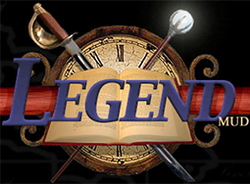LegendMUD
1994 video game From Wikipedia, the free encyclopedia
LegendMUD is a text-only MUD game founded by a group of friends including virtual world designer Raph Koster. It features historically significant story elements and award-winning[2][3] gameplay. It opened publicly on February 14, 1994.[4][2] It has received critical praise for its research and attention to detail in reconstructing past cultures within the game context.[5]
| LegendMUD | |
|---|---|
 | |
| Developer(s) | Project community |
| Producer(s) | Ruth Williams Todd McKimmey Mike Weatherbee |
| Designer(s) | Raph and Kristen Koster, Rick and Sherry Delashmit[1] |
| Engine | DikuMUD |
| Platform(s) | Platform independent |
| Release | 1994 |
| Genre(s) | Historical fantasy MUD |
| Mode(s) | Multiplayer |
Game characteristics

The thematic structure of LegendMUD is based on a literal interpretation of historical legend, with content based on real locales at various points in history, but with mythological elements included as concrete reality.[4][5] LegendMUD was derived from DikuMUD. At present, it features over 8,000 rooms contained within 60 areas.[4]
LegendMUD features several innovations, one of which was that players were not required to select a character class, such as mage or warrior.[1] Rather, a skill system is used, which has been noted as extensive and original.[5] The player selects a hometown affecting the types of skills which are then possible to learn. For example, a character from the industrial period in San Francisco has the opportunity to learn about guns, but cannot learn magic. In contrast, a character from ancient period Ireland is capable of learning druidic skills, but can never learn about more modern ideas such as field surgery.[5]
To further innovate on the learning of skills, the character must through interaction with non-player characters learn whatever that NPC had to teach, with some of these requiring a small form of quest.
History
In October 1995, LegendMUD was selected as The Mud Connector's Mud of the Month.[3]
Koster wrote "A Story About a Tree", a short essay and epitaph about the death of a LegendMUD player named Karyn. An investigative journalist later disproved evidence of Karyn's death.[6] Richard Bartle considered the incident to be a key event in the development of virtual worlds' ethics, similar to "A Rape in Cyberspace".[verification needed] The 'death' demonstrated that people can develop feelings for each other via the virtual world medium, thus experiencing real emotions about somebody they've never met, even an entirely fictional persona. A Story About a Tree is considered as a major counterargument against the "it's just a game" point of view on virtual worlds. Furthermore, it showcased that while being a very real object of grief to one party, it can indeed remain just a game for another.[7]
References
External links
Wikiwand - on
Seamless Wikipedia browsing. On steroids.
